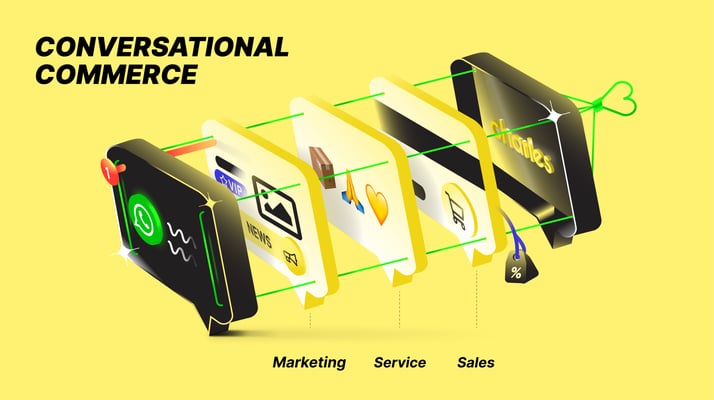By Typie
WhatsApp marketing assistant
Conversational Commerce
,Guides
To run a successful WhatsApp channel as an eCommerce brand, you need a great conversational commerce (cCom) strategy. Here we tell you what cCom is, why it's important, and how to build a winning strategy for your WhatsApp marketing.
Conversational commerce is a rapidly growing aspect of online business that involves interacting with customers through messaging platforms, chatbots, and voice assistants. This approach allows businesses to provide personalized customer experiences, streamline their sales process, and foster deeper connections with their customers.
What is conversational commerce?
Conversational commerce is the fusion of messaging apps and eCommerce. It's a way for businesses to communicate with customers in a conversational manner, using messaging apps like WhatsApp, for marketing, or to sell products and services. Conversational commerce allows businesses to have real-time conversations with customers, providing a personalized and engaging experience.
Use your cCom strategy to drive customer engagement and conversion
cCom strategy refers to the methods and practices used to implement conversational commerce in a way that effectively drives customer engagement and encourages conversion. By leveraging messaging platforms and intelligent chatbots, businesses can create seamless interactions that guide customers through the buying process, answer questions, and offer personalized recommendations.
Why is conversational commerce important?
Conversational commerce is important for eCommerce brands because it helps to build a relationship with customers. By providing a personalized and engaging experience, businesses can increase customer loyalty and retention. Additionally, conversational commerce can help to reduce customer acquisition costs (CAC) and increase customer lifetime value (CLV).
How to build a successful conversational commerce strategy
Building a successful conversational commerce strategy requires a few key elements:
1. Understand your target audience
Before you start building your conversational commerce strategy, you need to understand your target audience. Who are they? What are their pain points? What motivates them to buy? Understanding your target audience is essential for creating a personalized and engaging experience.
2. Choose the right messaging app
Choosing the right messaging app is crucial for the success of your conversational commerce strategy. WhatsApp is one of the most popular messaging apps in the world, with over 2 billion monthly active users.
WhatsApp also offers a range of features that make it ideal for conversational commerce, including the ability to send marketing campaigns, create shopping carts, and have multiple conversations through multiple agents with only one WhatsApp business number.
3. Segment your audience
Segmenting your audience is important for targeting the right people with the right message. You can segment your audience based on a variety of criteria, including demographics, behavior, and interests. By segmenting your audience, you can create personalized and relevant messages that are more likely to convert.
4. Use automation
Chatbots can help to automate conversations with customers, providing a more efficient and personalized experience. WhatsApp automation can be used to answer frequently asked questions, recommend products, and even complete transactions. By using chatbots, you can provide a 24/7 service to customers, even when you're not available.
5. Measure your results
Measuring the results of your conversational commerce strategy is important for understanding what's working and what's not. You can use metrics like conversion rate, open rate, and click-through rate to measure the success of your campaigns. By measuring your results, you can make data-driven decisions to improve your strategy over time.
Tips for creating an effective cCom strategy
- Choose the right messaging platform: Research and select a messaging platform that caters to your target audience and aligns with your business goals.
- Integrate with existing systems: Ensure that your chosen platform can be easily integrated with your current CRM, eCommerce, and marketing systems for seamless customer interactions.
- Design engaging user experiences: Create easy-to-navigate interfaces and employ natural language processing (NLP) to facilitate smooth interactions between customers and chatbots.
Best practices for optimizing conversational commerce
- Personalization: Leverage customer data to provide tailored experiences, product recommendations, and targeted offers.
- Automation: Use AI-powered chatbots to handle routine customer inquiries, freeing up your team to focus on more complex issues.
- Analytics: Monitor and analyze customer interactions to identify trends, optimize performance, and continually improve your cCom strategy.
Conclusion
Conversational commerce is the future of eCommerce, and WhatsApp marketing is one of the best ways to engage with customers in a conversational manner.
By understanding your target audience, choosing the right messaging app, segmenting your audience, using chatbots, and measuring your results, you can build a successful conversational commerce strategy for your eCommerce brand.
As eCommerce continues to evolve, conversational commerce will play an increasingly vital role in enhancing customer experience and driving sales. By implementing a well-planned cCom strategy that leverages AI, personalization, and analytics, businesses can stay ahead of the curve and create lasting connections with their customers.
Related questions
What kind of businesses can benefit from conversational commerce?
Any business that interacts with customers can benefit from conversational commerce. However, it is particularly effective for growing DTC eCommerce brands or even enterprises looking to build relationships with their customers.
How can I measure the success of my conversational commerce strategy?
To measure the success of your conversational commerce strategy, track key performance indicators (KPIs) such as conversion rates, customer retention rates, average order value (AOV), customer satisfaction scores (CSAT), and net promoter score (NPS).
Can I use conversational commerce to reduce customer acquisition costs (CAC)?
Yes, conversational commerce can help reduce customer acquisition costs by leveraging existing customers and driving organic growth through word-of-mouth referrals. Additionally, it allows businesses to interact with customers in real-time, which can help resolve issues quickly and effectively.




-134e6.jpg)
![How to use WhatsApp Business for eCommerce [+ 12 use cases] | charles](jpg/s_e-c-previewc5bd.jpg)
